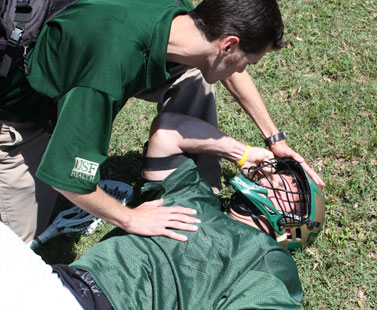USF physician: Kids shouldn't return to game too soon after concussions
Tampa, FL (July 26, 2010) — Your son suffers a helmet-to-helmet collision during football training camp. Your daughter falls and hits the back of her head on the soccer field during practice. They’re conscious, but confused, so you go to the emergency room as a precaution. The diagnosis is mild concussion – a change in mental function following head injury.
After a few days of rest, your child is begging to get back in the game, but how can you be sure it’s safe for him or her to return to the playing field?

With physical and mental rest, most concussions subside on their own within five to seven days, said Dr. Eric Coris, director of Primary Care Sports Medicine at USF Health and a member of the USF Concussion Center. “But, sometimes even after symptoms seem to resolve and your child tells you they feel normal, the brain is still vulnerable to injury.”
Children who return to the game too soon may suffer from lack of focus or slower reaction times that can increase the likelihood of other injuries, including another concussion. Another blow to the head before complete recovery from the initial concussion may occasionally result in life-threatening brain swelling, Dr. Coris said. Research indicates that younger, less developed brains are at greater risk for this condition, known as second-impact syndrome.
The following include symptoms to watch for as your child heals from a concussion:
• Headache
• Blurry or double vision
• Dizziness
• Personality changes (even mild) like irritability or unexplained crying
• Loss of balance
• Confusion
• Difficulty concentrating
• Sleep problems
• Ringing in ears
If any of these symptoms persist or worsen, seek medical attention immediately.
Children should be completely symptom free at rest, completely symptom free with exertion, and be evaluated by a physician experienced in the evaluation of concussions in athletes before returning to practice or play sports,” Dr. Coris said. “When in doubt, always keep them out.”
– USF Health –
USF Health (www.health.usf.edu) is dedicated to creating a model of health care based on understanding the full spectrum of health. It includes the University of South Florida’s colleges of medicine, nursing, and public health; the schools of biomedical sciences as well as physical therapy & rehabilitation sciences; and the USF Physicians Group. With more than $380.4 million in research grants and contracts last year, the University of South Florida is one of the nation’s top 63 public research universities and one of only 25 public research universities nationwide with very high research activity that is designated as community-engaged by the Carnegie Foundation for the Advancement of Teaching.

